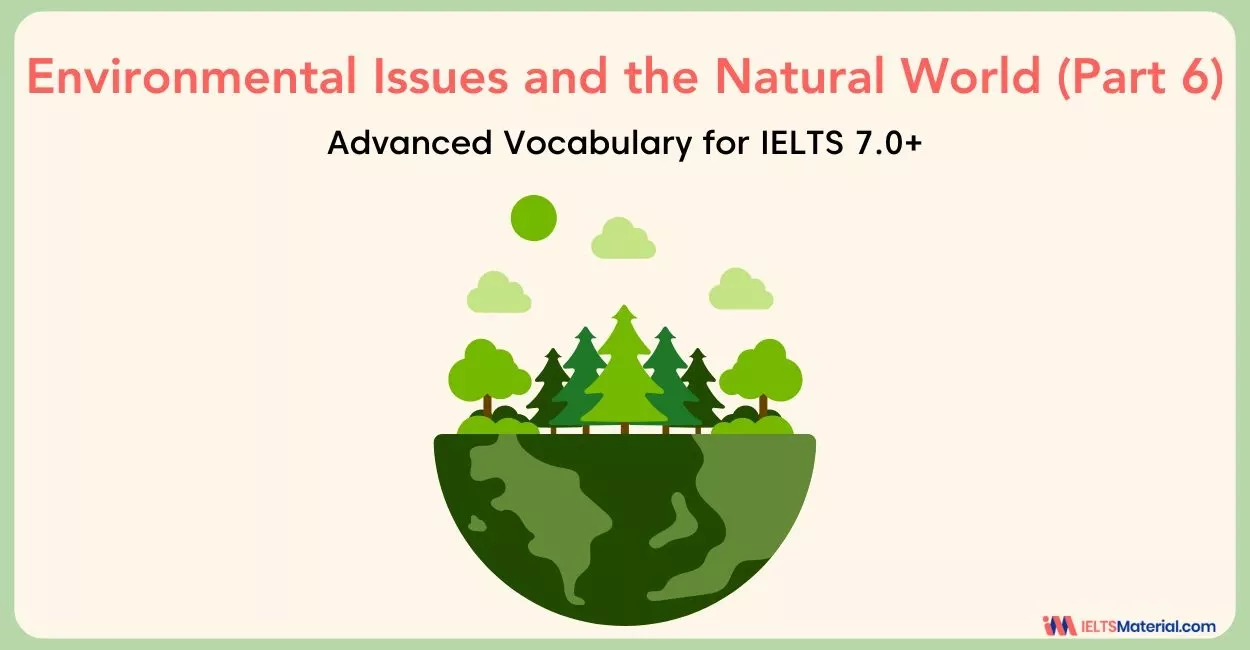Advanced Vocabulary for IELTS 7.0+: Environmental Issues and the Natural World (Part 6)
7 min read
Updated On
-
Copy link
Strengthen your performance with advanced IELTS vocabulary on environmental issues and the natural world. This guide provides definitions, contextual examples, and focused practice exercises to expand your lexical range and coherence for IELTS band 7+.
Table of Contents
- Collocations on Climate, Energy, and Resources
- Collocations on Pollution, Disasters, and Species
- Collocations on Energy, Waste, and Conservation
- Exercises Based on Advanced Environmental Issues and the Natural World Vocabulary for IELTS 7.0 +
- Answer Key for Exercises Based on Advanced Environment Vocabulary for IELTS 7.0 +
- Additional Resources for Improving Your Environment Vocabulary for IELTS

Limited-Time Offer : Access a FREE 10-Day IELTS Study Plan!
Environmental issues and the natural world are recurring topics in the IELTS exam, particularly in Writing Task 2 essays, reading passages, and Speaking Part 3 discussions. To score Band 7.0 or higher in lexical resource, you need to use precise collocations and natural word pairings that native speakers commonly use when discussing climate change, sustainability, and ecological issues.
In this blog, we will explore IELTS Vocabulary words lists for Band 8 or 9 of essential collocations with strong environmental relevance to broaden your vocabulary for high-scoring answers.
Collocations on Climate, Energy, and Resources
This table highlights collocations related to climate change, energy efficiency, and natural resources, which are frequently mentioned in academic IELTS contexts.
|
Collocation |
Meaning |
Example Sentence |
|---|---|---|
|
Greenhouse gases |
gases that trap heat in the atmosphere, e.g., CO₂, methane |
Cutting greenhouse gases is vital to slowing global warming. |
|
Precious metals |
valuable natural elements like gold, silver, platinum |
Mining for precious metals often harms local ecosystems. |
|
Renewable energy |
energy from natural sources that are replenished, like wind or solar |
Renewable energy reduces dependence on fossil fuels. |
|
Sustainable development |
growth that meets needs without harming future generations |
The UN promotes sustainable development goals globally. |
|
Water shortage |
a lack of sufficient water to meet demand |
Severe water shortages are expected in urban areas. |
|
Habitat destruction |
damage to natural living spaces of animals or plants |
Habitat destruction is a leading cause of extinction. |
|
Aerosol sprays |
pressurised sprays that release chemicals into the air |
Aerosol sprays once contained ozone-depleting substances. |
|
Paddy fields |
flooded fields used to grow rice |
Rising sea levels threaten paddy fields in Asia. |
|
Acid rain |
rain made acidic by industrial pollution |
Acid rain damages forests and freshwater ecosystems. |
|
Catalytic converter |
a device in cars that reduces toxic emissions |
All modern cars must be fitted with catalytic converters. |
|
Dumping ground |
an area where waste is irresponsibly discarded |
Many rivers have become dumping grounds for plastic. |
|
Energy-efficient |
using less energy to perform the same task |
Energy-efficient appliances lower electricity bills. |
|
Climate change |
long-term shifts in global temperatures and weather patterns |
Climate change has intensified heatwaves worldwide. |
|
Oil spill |
release of liquid petroleum into the environment, especially oceans |
The oil spill devastated marine life along the coast. |
Book IELTS online classes to learn new environment vocabulary for the IELTS test!
Collocations on Pollution, Disasters, and Species
This table focuses on collocations that describe pollution, natural disasters, and the extinction of species, themes that IELTS candidates encounter in both IELTS Reading passages and essay tasks.
|
Collocation |
Meaning |
Example Sentence |
|---|---|---|
|
Industrial waste |
unwanted by-products from manufacturing |
The factory was fined for dumping industrial waste in the river. |
|
Heat wave |
a prolonged period of excessively hot weather |
Southern Europe suffered its worst heat wave in decades. |
|
Bush fire |
uncontrolled fire in forests/grasslands |
The bush fire destroyed thousands of hectares of land. |
|
Geothermal power |
energy derived from the Earth’s heat |
Iceland generates most of its electricity from geothermal power. |
|
Toxic waste |
hazardous waste harmful to health or the environment |
The company was accused of illegally dumping toxic waste. |
|
Factory fumes |
harmful gases emitted from industrial production |
Factory fumes contribute heavily to urban smog. |
|
Exhaust fumes |
gases expelled from a vehicle engine |
Exhaust fumes are a major source of air pollution. |
|
Coastal erosion |
wearing away of coastlines by waves, tides, or currents |
Coastal erosion has forced some communities to relocate. |
|
Endangered species |
animals or plants at risk of extinction |
Conservation laws aim to protect endangered species. |
|
Mass extinction |
large-scale disappearance of species |
Scientists warn we are entering a new mass extinction. |
|
Food chain |
a series of organisms dependent on each other for food |
Pollution disrupts the food chain in marine environments. |
|
Animal welfare |
the ethical treatment of animals |
Animal welfare groups protest against factory farming. |
|
Waste disposal |
the process of discarding or managing waste |
Effective waste disposal is essential in cities. |
|
Carbon footprint |
the amount of CO₂ emissions from human activity |
Flying increases your personal carbon footprint. |
Join a FREE online webinar to learn how to boost your IELTS vocabulary for success!
Collocations on Energy, Waste, and Conservation
This table deals with energy sources, waste management, and conservation practices — key areas in the reading module and IELTS Writing tasks.
|
Collocation |
Meaning |
Example Sentence |
|---|---|---|
|
Fossil fuels |
non-renewable energy sources like coal, oil, gas |
Fossil fuels remain the largest contributor to carbon emissions. |
|
Nuclear fallout |
radioactive particles after a nuclear explosion |
The nuclear fallout rendered the area uninhabitable. |
|
Refuse collection |
the system of collecting household rubbish |
Refuse collection is delayed during public holidays. |
|
Organic produce |
food grown without synthetic chemicals |
Consumers increasingly prefer organic produce. |
|
Landfill site |
an area where waste is buried |
Landfill sites release methane, a powerful greenhouse gas. |
|
Compost heap |
a pile where organic waste decomposes naturally |
Gardeners keep compost heaps to create natural fertilizer. |
|
Exhaust fumes |
gases released from vehicles or machines |
Exhaust fumes pollute the air in most big cities. |
|
Wildlife campaigner |
a person advocating for the protection of animals |
Wildlife campaigners work to save endangered species. |
|
Septic tank |
underground tank for sewage treatment |
Rural houses often rely on septic tanks. |
|
Recyclable waste |
materials that can be processed for reuse |
Glass and paper are common examples of recyclable waste. |
|
Oil slick |
a large patch of oil on the surface of the sea |
The oil slick spread rapidly along the coastline. |
|
Climate proxies |
natural records like ice cores used to study climate |
Scientists use climate proxies to reconstruct past climates. |
|
Non-renewable resources |
resources that cannot be replenished |
Coal and petroleum are non-renewable resources. |
|
Wind turbine |
a machine that converts wind into electricity |
Wind turbines are common in rural landscapes. |
Explore our Vocabulary for IELTS to amp up your vocabulary for IELTS!
Exercises Based on Advanced Environmental Issues and the Natural World Vocabulary for IELTS 7.0 +
In order to improve your band score, you cannot learn the meaning of words and some sentences. The best way to learn how to use it effectively is to do vocabulary exercises that help your brain move words from short-term to long-term memory.
So, given below are some exercises based on environmental issues and the natural world vocabulary for IELTS that will help you improve your word choice and boost your IELTS vocabulary.
(A) Match the words in Column A to their strongest collocates in Column B.
| Column A | Answer | Column B |
| (a) greenhouse
(b) precious (c) renewable (d) sustainable (e) water (f) habitat (g) aerosol (h) paddy (i) acid (j) catalytic (k) dumping (l) energy (m) climate (n) oil |
(i) metals
(ii) shortage (iii) sprays (iv) destruction (v) converter (vi) spill (vii) rain (viii) fields (ix) development (x) efficient (xi) change (xii) energy (xiii) ground (xiv) gases |
(B) Match the words in Column A to their strongest collocates in Column B.
| Column A | Answer | Column B |
| (a) industrial
(b) heat (c) bush (d) geothermal (e) toxic (f) factory (g) exhaust (h) coastal (i) endangered (j) mass (k) food (1) animal (m) waste (n) carbon |
(i) wave
(ii) farming (iii) waste (iv) footprint (v) disposal (vi) power (vii) waste (viii) extinction (ix) fumes (x) erosion (xi) chain (xii) welfare (xiii) species (xiv) fire |
(C) Match the words in Column A to their strongest collocates in Column B.
| Column A | Answer | Column B |
| (a) fossil
(b) nuclear (c) refuse (d) organic (e) landfill (f) compost (g) exhaust (h) wildlife (i) septic (j) recyclable (k) oil (1) climate (m) non-renewable (n) wind |
(i) proxies
(ii) fuels (iii) fallout (iv) turbine (v) collection (vi) site (vii) produce (viii) waste (ix) fumes (x) campaigner (xi) slick (xii) resources (xiii) tank (xiv) heap |
Answer Key for Exercises Based on Advanced Environment Vocabulary for IELTS 7.0 +
(A)
a xiv b. i c. xii d. ix e. ii
f iv g. iii h. viii i. vii j. v
k xiii l. x m. xi n. vi
(B)
a vii b. i c. xiv d. vi e. iii
f ii g. ix h. x i. xiii j. viii
k xi l. xii m. v n. iv
(C)
a ii b. iii c. v d. vii e. vi
f xiv g. ix h. x i. xiii j. viii
k xi l. i m. xii n. iv
Feeling unsure of yourself while practicing IELTS vocabulary?
Book a FREE Demo to learn from experts!
Additional Resources for Improving Your Environment Vocabulary for IELTS
Here are some additional links to help you learn more environment vocabulary for IELTS:
- Advanced Vocabulary for IELTS 7.0 +: ENVIRONMENTAL ISSUES AND THE NATURAL WORLD (Part 1)
- Advanced Vocabulary for IELTS 7.0 +: ENVIRONMENTAL ISSUES AND THE NATURAL WORLD (Part 2)
- Advanced Vocabulary for IELTS 7.0+:Environmental Issues and The Natural World(Part 3)
- Advanced Environment Vocabulary for IELTS 7.0 +: Environmental Issues and the Natural World (Part 4)
- Advanced Vocabulary for IELTS 7.0 +: Environmental Issues And The Natural World(Part 5)
- Advanced Vocabulary for IELTS 7.0 +: ENVIRONMENTAL ISSUES AND THE NATURAL WORLD (Part 7)
- Advanced Vocabulary for IELTS 7.0 +: Environmental Issues And The Natural World (Part 8)
In conclusion, advanced collocations make your arguments on any topic far more precise if used appropriately. Moreover, using natural collocations shows fluency and topic-specific vocabulary. So, by mastering these collocations, you will boost your IELTS band score and communicate confidently about one of the most pressing issues of our time - the future of our planet.
Useful Links:
- Useful Phrases & Expressions About Environment: Advanced Vocabulary for IELTS Speaking
- Vocabulary for IELTS (Essential words for popular topics in IELTS)
- Practical Tips on How to Improve Vocabulary for the IELTS Exam
- Using Contrast in IELTS Speaking & Writing: Advanced Grammar in IELTS
- Useful Resources & Websites for IELTS Vocabulary

Start Preparing for IELTS: Get Your 10-Day Study Plan Today!
Improve your Vocabulary from our Vocabulary Topics



Recent Articles

Nitika Gupt

Nehasri Ravishenbagam

Nehasri Ravishenbagam






Post your Comments